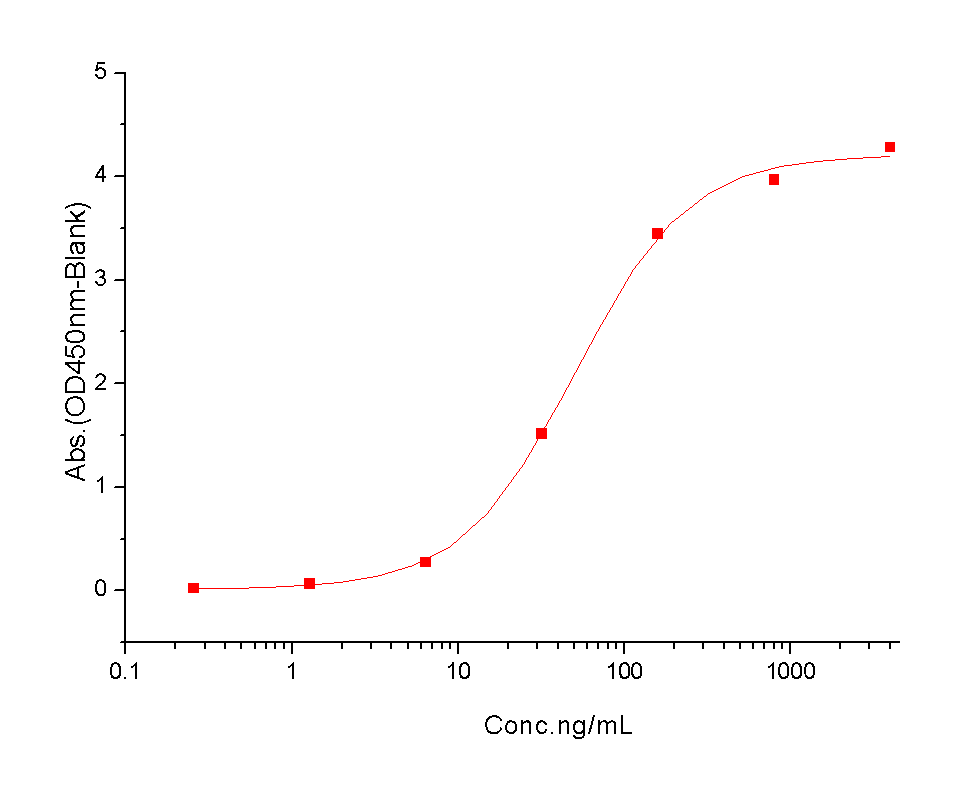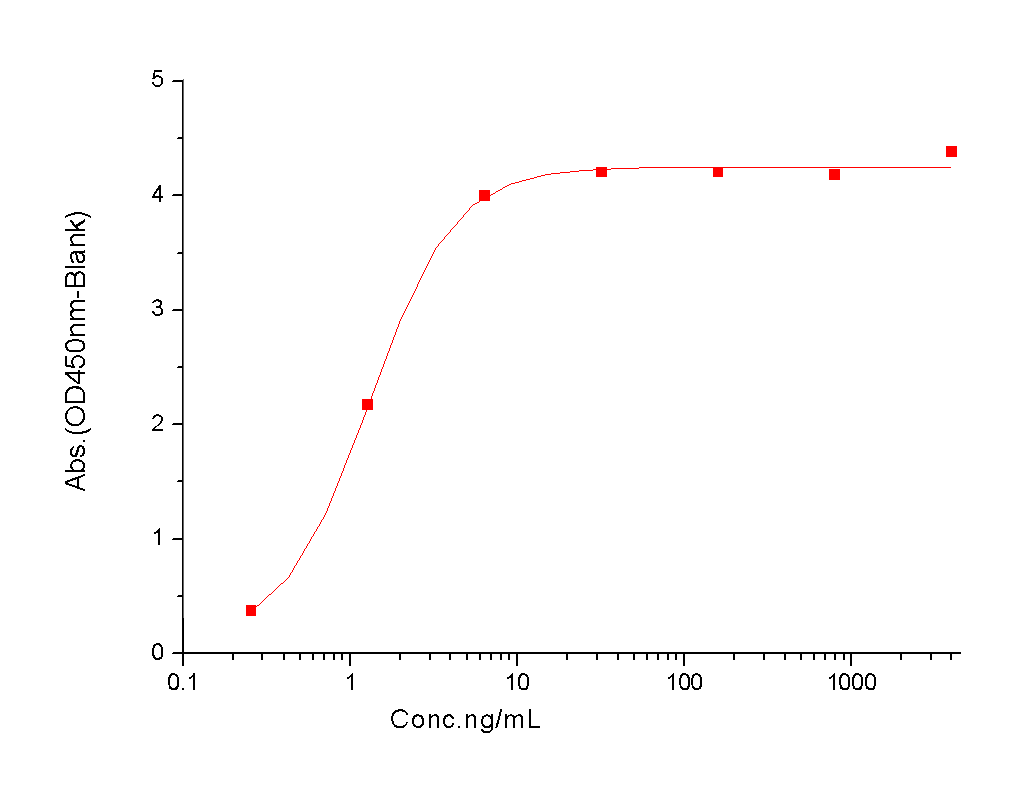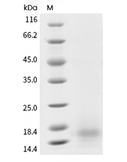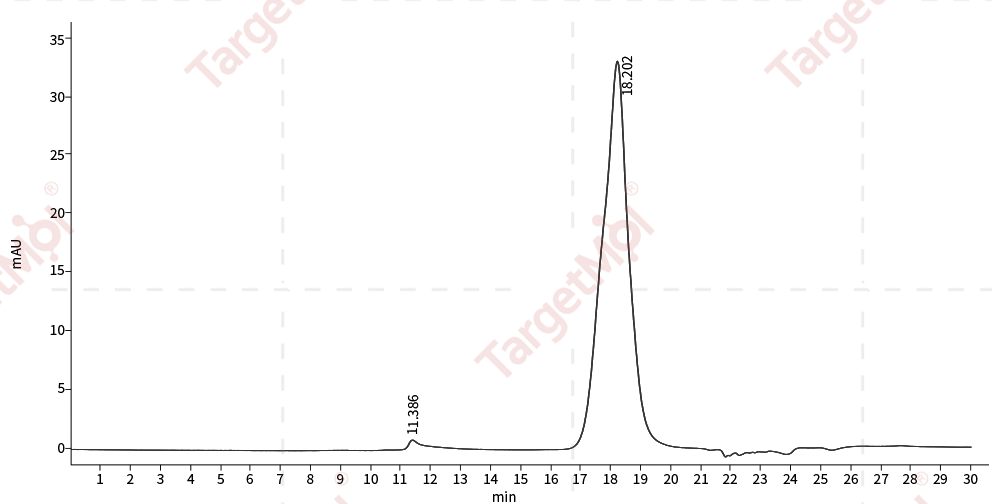Shopping Cart
- Remove All
 Your shopping cart is currently empty
Your shopping cart is currently empty

BCMA/TNFRSF17 Protein, Human, Recombinant (His) is expressed in HEK293 mammalian cells with His tag. The predicted molecular weight is 7.3 kDa and the accession number is Q02223-1.

| Pack Size | Price | Availability | Quantity |
|---|---|---|---|
| 50 μg | $218 | In Stock | |
| 100 μg | $387 | 7-10 days | |
| 200 μg | $684 | 7-10 days | |
| 500 μg | $1,450 | 7-10 days |
| Biological Activity | 1. Immobilized Human BAFF at 2μg/mL (100 μl/well) can bind Human BCMA , The EC50 of Human BCMA is 30-80 ng/mL._x000D_
2. Immobilized Mouse TNFSF13 at 2μg/mL (100 μl/well) can bind Human BCMA , The EC50 of Human BCMA is 0.6-2.1 ng/mL.   |
| Description | BCMA/TNFRSF17 Protein, Human, Recombinant (His) is expressed in HEK293 mammalian cells with His tag. The predicted molecular weight is 7.3 kDa and the accession number is Q02223-1. |
| Species | Human |
| Expression System | HEK293 Cells |
| Tag | C-His |
| Accession Number | Q02223-1 |
| Synonyms | tumor necrosis factor receptor superfamily member 17,TNFRSF13A,CD269,BCMA,BCM |
| Construction | A DNA sequence encoding the human TNFRSF17 (NP_001183.2) (Met1-Ala54) was expressed with a polyhistidine tag at the C-terminus. Predicted N terminal: Met 1 |
| Protein Purity | ≥ 95 % as determined by SDS-PAGE. ≥ 95 % as determined by SEC-HPLC.   |
| Molecular Weight | 7.3 kDa (predicted); 16.9 and 12.4 kDa (reducing condition, due to glycosylation) |
| Endotoxin | < 1.0 EU/μg of the protein as determined by the LAL method. |
| Formulation | Lyophilized from a solution filtered through a 0.22 μm filter, containing PBS, pH 7.4. Typically, a mixture containing 5% to 8% trehalose, mannitol, and 0.01% Tween 80 is incorporated as a protective agent before lyophilization. |
| Reconstitution | A Certificate of Analysis (CoA) containing reconstitution instructions is included with the products. Please refer to the CoA for detailed information. |
| Stability & Storage | It is recommended to store recombinant proteins at -20°C to -80°C for future use. Lyophilized powders can be stably stored for over 12 months, while liquid products can be stored for 6-12 months at -80°C. For reconstituted protein solutions, the solution can be stored at -20°C to -80°C for at least 3 months. Please avoid multiple freeze-thaw cycles and store products in aliquots. |
| Shipping | In general, Lyophilized powders are shipping with blue ice. |
| Research Background | Tumor necrosis factor receptor superfamily, member 17 (TNFRSF17), also known as B cell maturation antigen (BCMA) or CD269 antigen, is a member of the TNF-receptor superfamily. This receptor is preferentially expressed in mature B lymphocytes, and may be important for B cell development and autoimmune response. This receptor has been shown to specifically bind to the tumor necrosis factor (ligand) superfamily, member 13b (TNFSF13BBAFF), and to lead to NF-kappaB and MAPK8/JNK activation. TNFRSF17/BCMA/CD269 also binds to various TRAF family members, and thus may transduce signals for cell survival and proliferation. TNFRSF17/BCMA/CD269 is a receptor for TALL-1 and BCMA activates NF-kappaB through a TRAF5-, TRAF6-, NIK-, and IKK-dependent pathway. The identification of TNFRSF17 as a NF-kappaB-activating receptor for TALL-1 suggests molecular targets for drug development against certain immunodeficient or autoimmune diseases. TNFRSF17/BCMA is a target of donor B-cell immunity in patients with myeloma who respond to DLI. Antibody responses to cell-surface BCMA may contribute directly to tumor rejection in vivo. |

Copyright © 2015-2025 TargetMol Chemicals Inc. All Rights Reserved.